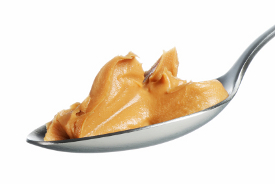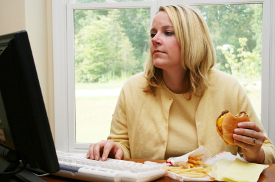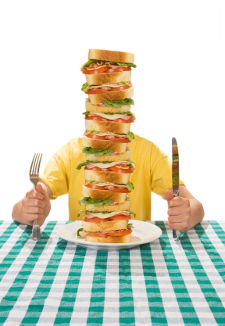Boost Your Workouts With This Zero-Calorie Nutrient
What's one nutrient that has zero calories yet can boost your energy while working out? Water! Water is not only important to drink as you go about your daily business, but you need to make sure you're drinking enough while working out. Dehydration can make you run out of steam while exercising -- and even contribute to a lack of coordination, which will effect your form and could potentially contribute to an exercise-related injury.
You see, your body needs water to help it do certain things like regulate your body temperature, carry oxygen and nutrients to cells -- and to help your heart function at its best. If you're dehydrated, your workouts could suffer.
But how much water should you drink when you've got a workout planned? And when? Here are some tips on how much to drink before, during and after exercise:
Read More »
You see, your body needs water to help it do certain things like regulate your body temperature, carry oxygen and nutrients to cells -- and to help your heart function at its best. If you're dehydrated, your workouts could suffer.
But how much water should you drink when you've got a workout planned? And when? Here are some tips on how much to drink before, during and after exercise:
Add Peanut Butter to Your Diet the Right Way
Peanut butter and jelly go hand in hand, everyone knows that. But did you know peanut butter is good for you and has weight loss benefits? Before you start using peanut butter, understand that the type of peanut butter you use in your diet does make a difference. Regular peanut butter contains additives, preservatives, salt and added sugar. If you read the label, most will say that regular peanut butter contains no trans fats even though it does have it. When you look at the label, you'll see that it has 'partially hydrogenated oil' listed. How can these peanut butters list no trans fat when it's an ingredient? The FDA allows it because it's less than a certain amount. What's the big deal with trans fats? They increase your risk of developing heart disease. These types of fats begin as a liquid but are changed to a solid form within the peanut butter.
Read More »
5 Ways to Plan Your Meals Ahead of Time
One of the most effective strategies for losing weight and sticking to your diet is to plan ahead. While it may seem difficult at first to be prepared, the results will astound you.
Here are some ideas to help you plan your meals without spending too much of your valuable time:
Read More »
Here are some ideas to help you plan your meals without spending too much of your valuable time:
5 Ways to Avoid Workplace Diet Temptations
One of the hardest places to stick to your diet is the office. And since you probably spend a large majority of your time at work, you need to have some strategies to help you deal with the temptations you'll face.
Here are five ways to avoid those workplace diet temptations:
Stock up on snacks. Keep healthy snacks available at all times. You may want to designate a drawer in your desk for them. When you're feeling hungry, instead of heading to the vending machine for a candy bar you'll have healthier options.
Read More »
4 Healthier Choices for Salad Dressings
You're sabotaging your weight loss efforts by using processed salad dressing. Check out these four healthy substitutes to unhealthy salad dressings that are delicious, too!
Read More »
Are Your Liquid Calories Making You Gain Weight?
When you look at your diet, do you only look at the food you're eating? Are you scratching your head wondering why you've been gaining weight when you're so sure you've been eating better? One thing you may need to look into is how many calories you're drinking. No matter how healthy you think milk or juice is, it doesn't mean you can drink them all day long. Add in soda, alcoholic drinks, sports drinks or specialty coffees and you may be drinking yourself fat. Take a long, hard look at the calories you drink and see where you can whittle down the calories. It could make a big difference in your weight loss plan! Here are six ways you can reduce liquid calories:
Read More »
Take Your Diet to the Next Level
When you're working on improving your diet, it's easy to become overwhelmed by how to get started. Even if you're a seasoned dieter, you may wonder how you can get to the next step or how to make your diet a part of your lifestyle.
You need to determine where you are in order to know what you need to do next. Whether you're thinking about dieting for the first time in your life or you're trying to make your new changes something permanent, there are specific things you can do to take your diet to the next level.
Read More »
You need to determine where you are in order to know what you need to do next. Whether you're thinking about dieting for the first time in your life or you're trying to make your new changes something permanent, there are specific things you can do to take your diet to the next level.
Why Women Lose Weight More Slowly Than Men -- And What To Do About It
By Tom Venuto
www.BurnTheFat.com
You may have heard (or, heh, realized), that it's more difficult for women to lose fat than men. Immediately most people think it must be estrogen or hormonal issues. But perhaps the biggest factor is NOT hormones, but the simple fact that women are usually smaller and lighter than men.
When you have a smaller body, you have lower calorie needs. When you have lower calorie needs, your relative deficit (20%, 30% etc) gives you a smaller absolute deficit and therefore you lose fat more slowly than someone who is larger and can create a large deficit more easily.
For example, if my TDEE (total daily energy expenditure) is 3300 calories a day (I'm 5' 8" and moderately to very active), then a 20% deficit is 660 calories, which brings me to 2640 calories a day. On paper, that will give me about 1.3 lbs of wt loss per week, rather painlessly, I might add.
If I bumped my calorie burn up or decreased my intake by another 340 a day, that's enough to give me a 2 lbs per week wt loss.
That's hardly a starvation diet (Ahhh, the joys of being a man). For smaller women, the math equation is very different.
Read More »
www.BurnTheFat.com
You may have heard (or, heh, realized), that it's more difficult for women to lose fat than men. Immediately most people think it must be estrogen or hormonal issues. But perhaps the biggest factor is NOT hormones, but the simple fact that women are usually smaller and lighter than men.
When you have a smaller body, you have lower calorie needs. When you have lower calorie needs, your relative deficit (20%, 30% etc) gives you a smaller absolute deficit and therefore you lose fat more slowly than someone who is larger and can create a large deficit more easily.
For example, if my TDEE (total daily energy expenditure) is 3300 calories a day (I'm 5' 8" and moderately to very active), then a 20% deficit is 660 calories, which brings me to 2640 calories a day. On paper, that will give me about 1.3 lbs of wt loss per week, rather painlessly, I might add.
If I bumped my calorie burn up or decreased my intake by another 340 a day, that's enough to give me a 2 lbs per week wt loss.
That's hardly a starvation diet (Ahhh, the joys of being a man). For smaller women, the math equation is very different.
Can I Eat All My Calories for the Day in One Meal and Still Lose Weight?
You hear it everywhere now: if you want to lose weight, it helps to eat smaller meals more frequently. In other words, spread out the calories (energy) you take in over the course of day instead of eating all those calories in one sitting. This helps to keep your blood sugar level and curb cravings, amongst others.
Now, eating small meals more frequently doesn't mean you are automatically going to lose weight. You still need to be within a calorie deficit: to lose weight, you need to eat less calories than you burn in a day. So, let's say you eat 1500 calories and you burn 2000 calories in a day. That creates a reasonable calorie deficit of 500 calories.
Read More »
Now, eating small meals more frequently doesn't mean you are automatically going to lose weight. You still need to be within a calorie deficit: to lose weight, you need to eat less calories than you burn in a day. So, let's say you eat 1500 calories and you burn 2000 calories in a day. That creates a reasonable calorie deficit of 500 calories.
5 Tips to Avoid Plateaus and Metabolic Slowdown
Ask The Fat Loss Guru is a series of Q & A with fat loss expert, Tom Venuto. Tom is a natural bodybuilder, certified strength and conditioning specialist (CSCS) and a certified personal trainer (CPT). I've learned so much from Tom through is e-book, Burn the Fat, Feed the Muscle. No hype, no gimmicks -- Tom shoots straight from the hip, and tells you the truth about fat loss.
QUESTION: Tom, Is it possible to not lose body fat because you're eating too little? -Linda
ANSWER: Yes and no. This gets a little complicated so let me explain both sides.
Part one of my answer: I say NO, because if you are in a calorie deficit you WILL lose weight.
Most people have heard anecdotes of the dieter who claims to be eating 800 calories a day or some starvation diet level of intake that is clearly in a deficit and yet is not losing fat. Like the mythical unicorn, such an animal does not exist.
Reach Your Weight Loss Goals With FitWatch Tracker Sign up for free







